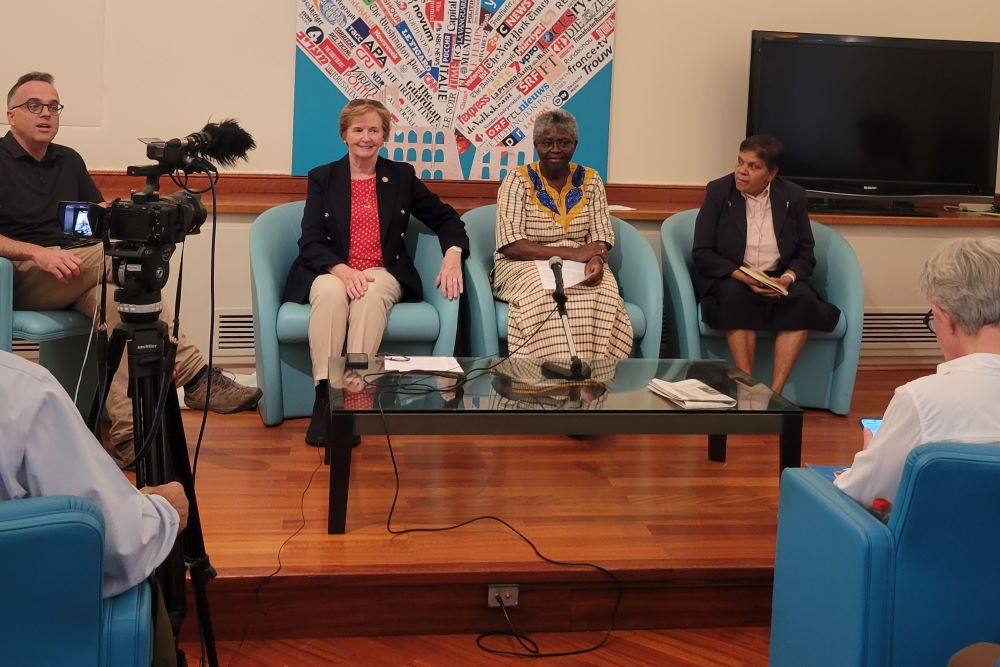
Speaking about the synod and the role of women in the Catholic Church are (from left): Sr. Jean Quinn, executive director of UNANIMA International; Sr. Maamalifar Poreku, coordinator of UISG's Sowing Hope for the Planet project; and Sr. Mary John Kudiyiruppil, UISG's associate executive secretary. The sisters were part of an Oct. 25 press conference in Rome. (GSR photo/Heidi Schlumpf)
Three Catholic sisters from different parts of the world said they are hopeful that the church's synodal process might bring increased leadership roles for women, but they also stressed that they already have significant influence as women religious.
The women spoke at an Oct. 25 press conference hosted by the International Union of Superiors General, or UISG, the umbrella organization for leaders of Catholic women's congregations, in the midst of the monthlong major summit on the future of the Catholic Church.
Sr. Mary John Kudiyiruppil, UISG's associate executive secretary*, said she has "moments of frustrations" working in a church that is "by and large led by the male hierarchy."
"But I believe also we are making progress," said Kudiyiruppil, a member of the Mission Congregation of the Servants of the Holy Spirit from India. "Things are improving and changing. I am hopeful."
Asked directly if she felt women were represented in the synod, Kudiyiruppil answered "proportionately not, but symbolically, yes."
Of the 365 voting members of the synod, 54 are women. Five women are representing UISG at the synod.
'I’m very happy with the vocation I have. I don't need hierarchal power to make an impact on the ground.'
—Sr. Maamalifar Poreku
They are "bold women, very knowledgeable women," who are "committed to the church, Kudiyiruppil said. "They will certainly make a contribution to the synod."
On the issue of women's ordination to priesthood or the diaconate, Sr. Maamalifar Poreku said she was "OK" with ordaining women, but added that she didn't expect to see it in her lifetime.
"What is important is that we need to work to change [the church's] structure," she said.
"We see change, but the change is slow," said Poreku, who is a Missionary Sister of Our Lady of Africa from Ghana and coordinator of UISG's Sowing Hope for the Planet project.
Poreku said she had no interest in becoming a priest. "I’m very happy with the vocation I have," she said. "I don't need hierarchal power to make an impact on the ground."
She praised Pope Francis' diplomacy in moving the church toward change. "He knows what he is doing," Poreku said. "He is a man of prayer, a very spiritual person. He listens to the Spirit."
Poreku also pointed out that the church is part of the wider patriarchal world. "Change in society is not easy. It's the same in the church," she said.
Advertisement
Sr. Jean Quinn of Ireland also wondered if church structures were ready for women's ordination, but said that some women were already "past that."
Quinn, a member of the Congregation of the Daughters of Wisdom who is executive director of UNANIMA International, an NGO at the United Nations, has worked in homeless ministry for many years.
"Some of us are not caught up in that issue [women's ordination] because there are so many people starving in the world, homeless or affected by climate change," Quinn said. "That's where my space is."
As a Catholic sister, she has privilege and a voice, Quinn said, adding, "We have to use that voice."
Yet she acknowledged that the synod has already broken down some hierarchal structures. "There is something happening," she said. "It's going to be very different."
*This story has been updated to correct Sr. Mary John Kudiyiruppil's title.







